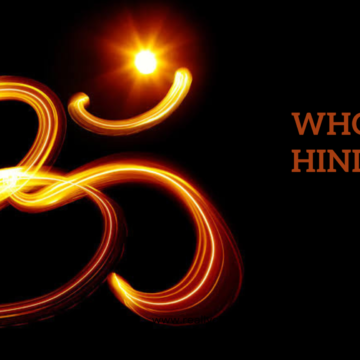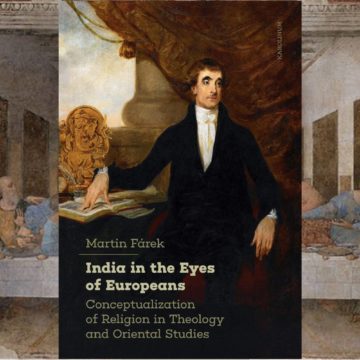In the second part, Dr. Pingali Gopal discusses the evolution of political Hindutva after independence, and sheds light on the failure to define the basic terms as we struggle with the alleged rise of ‘Hindu fundamentalism'.
Author: Pingali Gopal (Pingali Gopal)
Hindu, Hinduism, Hindutva – Part 1
Who exactly is a ‘Hindu’ and what are ‘Hinduism’ and ‘Hindutva’? Does it mean the land (geography), ancestral roots (history), or a shared culture?
Dr. Pingali Gopal tackles this proverbial bull by the horns, systematically looking at attempts to define and distinguish ‘Hinduism’ and ‘Hindutva’ by Western thought, the Indian liberal elite, and practising Hindus.
Philosophical Systems Of India – A Primer – Part 5
The problems in Western philosophical traditions arise due to many factors, mainly the confusion of the relation between mind and matter; and making philosophy subservient to scientific dogma. Indian philosophy is not a dry intellectual exercise and holds a definite purpose to propel humans into the highest realms of bliss. Indian and Western philosophical traditions run on two parallel tracks consequently.
Philosophical Systems Of India – A Primer – Part 4
In the fourth part of the 5-part series on Indian philosophical systems, Dr. Pingali Gopal discusses the prominent Advaitic view on the notions of the Self and the non-Self. We shall also see the notion of cause and effect in the material world and how the Self interacts with the material world. It is a promise of Indian Darshanas that proper knowledge confers liberation to the striving individual.
Philosophical Systems Of India – A Primer – Part 3
In the third part of the 5-part series on Indian philosophical systems, Dr. Pingali Gopal discusses the most important differing point of Indian philosophies from Western philosophy: Perception as a valid means of obtaining knowledge regarding the objects of the senses. In Western philosophy, perception is unreliable, and in the Indian tradition, perception is the eldest of the proofs needed to understand reality.
Unlike the western notions of an unknowable noumenon where the perceived world loses its intrinsic character, in Indian philosophy a conceived object cannot be unknowable; and if unknowable, it becomes inconceivable as well.
Philosophical Systems Of India – A Primer – Part 2
In the second part of the 5-part series on Indian philosophical systems, Dr. Pingali Gopal discusses the basics as well as the three categories of Indian philosophy, Advaita Vedanta, Vishishtadvaita Vedanta, and Dvaita Vedanta. He also deals with the root cause of the West's outlook on Indian philosophy and presents a rebuttal to some of the popular ideas of disharmony among schools of Indian philosophical thought that have been promulgated by the West.
Philosophical Systems Of India – A Primer – Part 1
In the first part of a 5-part series, Dr Pingali Gopal introduces the ideas of the great Indian philosophical systems to the uninitiated.
Western Philosophers equate philosophy with only western thought which, puts philosophy between theology and science, and in turn, is either ignorant or dismissive of Indian thought.
Indian philosophy (or Darshanas) does not have an extreme reverence for science and because of the biases of the West, and resulatantly has disappeared from popular discourses; being termed ‘religions’ and hence lacking any validity in a ‘secular’ world.
Dr Gopal delves further into classification of Indian systems as orthodox and non-orthodox on the acceptance or rejection respectively of the Vedas as a reliable authority, and uncovers depths of Jainism, Buddhism, Samkhya, Charavaka and Nyaya-Vaisheshika philosophies for the uninitiated.
Further installments of this series will foray into the other orthodox and non-orthodox branches of Indian philosophical systems.
‘India In The Eyes Of Europeans’ By Martin Farek: A Review Summary
‘India In The Eyes Of Europeans’ by Martin Farek, one of the scholars of the Comparative School of Cultures in the Czech Republic; is a book that analyses the biases of the Christian European scholarship in interpreting all that is foreign to it; especially the way that scholars influenced by Christian theology, Western and Indian alike, view Indian and more specifically Hindu history.
Kolkata And Sunderbans – Diaries Of A Whirlwind Tour
Dr. Pingali Gopal recounts his travel and stay in and around Kolkata, delves into the history of the city and its landmarks and monuments, and touches the soul of the 'City of Joy' in this very intriguing travelogue.
‘The Problem With Socialism’ by Thomas J. DiLorenzo: A Review-Summary
DiLorenzo's 'The Problem With Socialism' is a must-read for all the impressionable youth entering colleges preyed upon by heavily flawed discourses.





